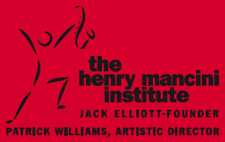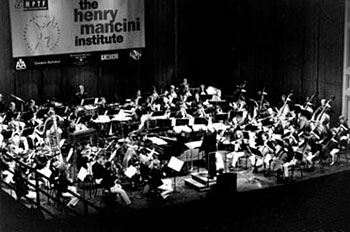

  |
|
|
||||||||||||||||||||||
|
FMS FEATURE... July 31, 2006 Mancini Institute's Tribute to American Film Music Wide-ranging program wows hundreds by Jon Burlingame  Each summer, the Institute plays host to 85 young "emerging professional musicians" chosen from more than 600 applicants from around the world. This year's ensemble, many observers said, was the best yet, in a near-flawless performance of a two-and-a-half-hour program of classic and modern film music. HMI artistic director Patrick Williams and Dallas Symphony Orchestra principal pops conductor Richard Kaufman – both past Grammy winners – conducted the majority of pieces on the program. The two exceptions were special, however, and elicited some of the loudest ovations of the evening: composers Johnny Mandel and Laurence Rosenthal conducting some of their finest work. Mandel conducted his original orchestral arrangements of "A Time for Love" from An American Dream (1966) and "Emily" from The Americanization of Emily (1964). Beautiful, delicate and lush, they are rarely heard in public, and the 80-year-old Oscar winner received a standing ovation afterward. Rosenthal conducted a three-movement suite from his score for The Miracle Worker (1962) – 12 minutes including "Helen Alone," "The Mischief Maker" and "The Miracle at the Pump" that worked superbly as a concert piece. Some audience members were visibly moved by the performance. It was the first time that the composer had conducted his score live in concert. Mancini himself was remembered via two pieces. The concert opened with "It Had Better Be Tonight," his samba from The Pink Panther (1964), and later featured the composer's 11-minute "Tribute to Victor Young," with Mancini arrangements of seven classic Young tunes, nearly all written for the screen: "Golden Earrings," "When I Fall in Love," "Sweet Sue," "Stella by Starlight," "My Foolish Heart," "Love Letters" and "Around the World in 80 Days."  Four other pieces on the program were performed to film: Williams' exhilarating music from the sailboat-race sequence of Violets Are Blue... (1986); the "Flying Over Africa" sequence from John Barry's Oscar-winning Out of Africa (1985); a new concert version of "Sayuri's Theme" from John Williams' Oscar-nominated score for Memoirs of a Geisha (2005); and the evening's finale, a five-minute suite from Danny Elfman's Spider-Man (2002), the latter conducted by Kaufman, which brought the audience to its feet once again. Rounding out the program were the rarely heard single-movement saxophone concerto that Franz Waxman created in 1963 from his memorable, 1951 Oscar-winning score for A Place in the Sun, with Jason Kush performing the difficult alto saxophone part; James Newton Howard's lovely theme from Man in the Moon (1991), Reese Witherspoon's first film; and Christopher Young's swinging, Mancini-esque theme for The Man Who Knew Too Little (1997). Veteran Mancini Institute concert-goers queried during the post-concert champagne reception felt that the orchestra had never been better; that the film clips (some of them montages) were more effective than in previous concerts; and that the wide-ranging nature of the program – from complex symphonic music to upbeat jazz numbers – showcased the orchestra's skills superbly. Adding to the prestige of the evening was an introduction by Sid Ganis, president of the Academy of Motion Picture Arts & Sciences. ©2006 Jon Burlingame |
Search
Past Features
Feature Archives
|